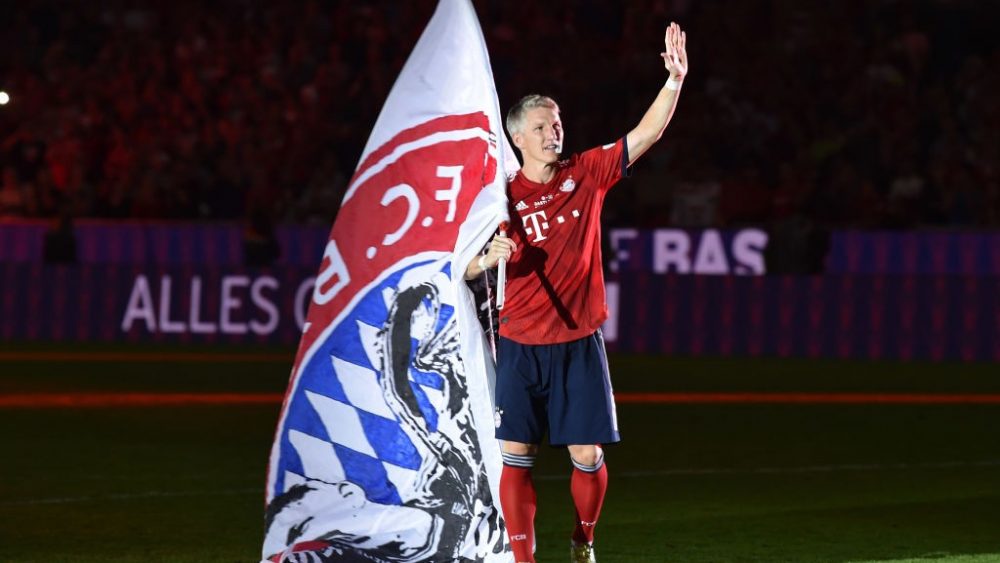Bye bye Basti!
The promotional video that the “Sportschau” used to introduce the latest addition to their panel of experts presented some of the biggest moments of Schweinsteiger as a football player. Our experts chime in with all the little, personal memories of the Bavarian midfielder that the video neglected to mention.
“This angry statement converted Schweini into Schweinsteiger”
Christian tweets and blogs as texterstexte and occasionally writes for Miasanrot.
It was the year 2011. Bayern did not have the best of seasons, even reaching a Champions League qualification place seemed in danger, when Bastian Schweinsteiger gave a remarkable press conference. He took a tabloid journalist to task, who had called him a “would-be boss”. Schweinsteiger was not a real leader, the journalist had claimed in his article. I will never forget his reaction. In its explicitness, it greatly elevated my appreciation of Schweinsteiger long before his memorable performances during Bayern’s treble-winning season or in the 2014 World Cup final:
“I am no would-be boss! Everybody listens to me in the dressing room. I do everything for the club. I play even though I am in pain, I always do my best to deliver a good performance. You don’t have to put on a strongman performance for the world outside. You don’t! It’s behind closed doors where you have show your personality, not to the outside.”
Then he finished with “liar, jerk, asshole” to show the journalist out. Not quite the most refined of registers perhaps, but in its authenticity and directness I liked even that.
In my view, this incident marked the beginning of a new era. Until then, in Germany you were considered a leader on the pitch if you were a fierce fighter who laid down a marker through robust tackling or angrily shouting at everyone in best alpha male fashion. After this press conference, however, the notion of what makes a leader in football was discussed in a new way: how to fuse a group of players into a team, how to keep everyone motivated, how to let people participate in decision making – such questions were suddenly seen in a whole new light. With this one angry eruption, “Schweini” became Schweinsteiger, Bayern’s (and later the national team’s) first modern leader alongside Philipp Lahm. A fierce fighter he was nonetheless – but that is another story for another day.
“A big heart, a clever mind and a skilled footballer too”
Tobias writes for TheFalseFullback and Miasanrot.
With the arrival of Louis van Gaal, Schweinsteiger stopped being the playful right winger and quickly became the pivot in Bayern’s defensive midfield. The significance of the decision by van Gaal to move him to the 6 has still not been fully appreciated. While 2010 was a great year for Schweinsteiger at Bayern, the focus was on Arjen Robben and Franck Ribéry. In the national team, he had to share the limelight with Thomas Müller, who had an outstanding tournament as well.
Nevertheless, Schweinsteiger’s importance for Bayern was never in question. That Bayern and he decided to extend his contract in the winter of 2010 despite interests from quite a few other clubs, was one of the most crucial decisions during this period of a golden generation at the club. I personally, however, did not fully realize quite how important a player he was until the game against Werder Bremen in the 2010/11 DFB Pokal. Robben was out with an injury and Bayern had difficulties finding their rhythm after the World Cup in the summer. And then all of a sudden, Bastian Schweinsteiger stepped up and scored two goals against Bremen in the final and became the crucial touchstone at the heart of Bayern’s game, something he should remain from then on until 2014.
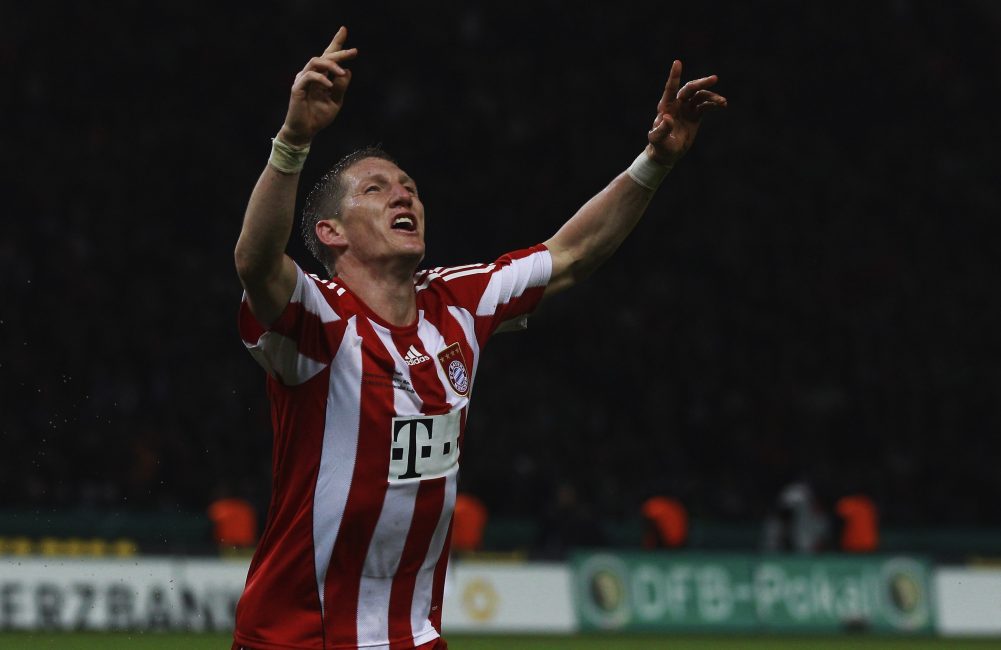
(Image: Alexander Hassenstein/Bongarts/Getty Images)
In this game, Schweinsteiger demonstrated everything that turned him into one of Germany’s most significant footballers of the following years. He pulled the strings in midfield, dictated the tempo of Bayern’s plays and was a constant threat with his runs from deep in the opponent’s penalty area. He also played with a lot of desire and was a standout presence on the pitch without replicating the traditional kind of leadership attitude of an Effenberg or Kahn. But he was a leader nevertheless, only different, not quite as loud but more by virtue of his actions. A lot of heart in combination with a quick mind and great footballing skills sum up his performance in this game – a summary just as well suited to describe his entire career. To conclude: thank you Bastian Schweinsteiger for the wealth of tremendous memorable moments for club and country you have given us over the years.
“The promise to build a new era”
Steffen writes for Miasanrot and web.de.
“Dear Bayern fans, you should be the first to know. I have been part of FC Bayern Munich for twelve years now and I wanted to say to you that I have extended my contract by another five years for you.”
In the blink of an eye, the Allianz Arena erupted into cheers as if Bastian Schweinsteiger had just scored the winning goal in the final minute. It was December 11, 2010. Bayern had just won the last home game of the year against St.Pauli with 3-0 goals and was waving a banner to say goodbye to their supporters. Schweinsteiger got hold of the microphone and announced his contract extension, which had not at all been certain at this time. Schweinsteiger had made a great step forward as a player under Louis van Gaal. The wiold card on the wings who had been increasingly questioned had turned into Bayern’s key playmaker in midfield. At the World Cup in 2010, he had proven that he could compete with the best of them. And now it was clear that Schweinsteiger would be spending the defining years of his career at Bayern.
I do not know how often I watched and rewatched this scene in the days, weeks, and months ahead, again and again. I was touched. Probably because it had been a long time since any Bayern player had professed his devotion to the club and its supporters so unequivocally and honestly.
Some see the 0-4 away win to Barcelona in 2009 as the starting point of Bayern’s golden era, others the signing of Louis van Gaal or Arjen Robben. For me, it was December 11, 2010. A period of recent success that had always seemed tentative, just as if it took but a minor setback for it to end thus became a big project. Philipp Lahm had extended his contract already, so too had Franck Ribéry. Now it was for Schweinsteiger to follow suit. Along with a pledge to launch a new era at Bayern together.
And boy, did they ever.
“Damn, there are worse places to do so.”
Stefan tweets as nobilor.
At some point I accidentally learned that his career had started at TSV 1860. A fun fact that would serve to raise a few funny eyebrows over the years. The reference was to TSV 1860 Rosenheim, of course, who besides Schweinsteiger and his brother Tobias have also been the origin of players like Julian Weigl and Thomas Broich.
Bastian Schweinsteiger has always been different. Bavarian nature boy, excellent skier, and never shy to venture the odd experiment with his hair during the budding years of his career. Legendary was his public friendship with Lukas Podolski, “Poldi”, the entertainer. All the while he was never one-dimensional, never able to be pegged as anything. A real character.
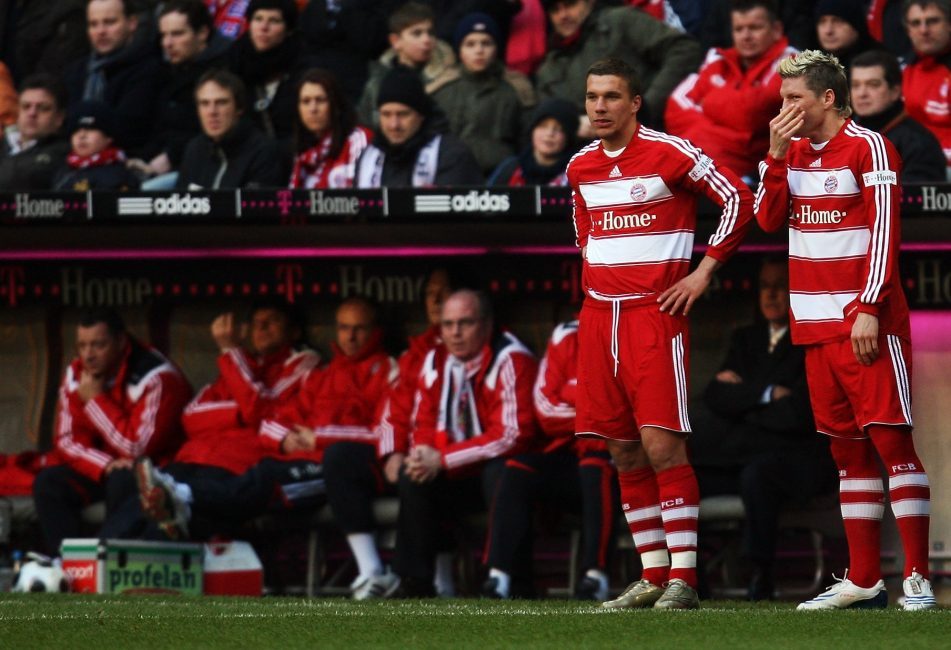
(Image: Lars Baron/Bongarts/Getty Images)
He did not reside in Grünwald or at the Tegernsee, but in the center of Munich. Among the people. And he was not remiss to prompt his neighborhood to go out and party, the World Cup in his hands. Friends in Munich have told me that he appeared at one of his regular pubs shortly after the World Cup triumph. Everybody got up on their feet and applauded. He said thanks all around, everyone sat down and he could go on to eat without interruption.
What will remain of his career? His unique running style, his overview and elegance in midfield. Keep calm and pass the ball to Schweinsteiger. Many great games, a missed penalty, a treble, a World Cup final. I wrote at the end of 2015 that he had left his mojo on the field at the Maracana. Perhaps he did, perhaps he did not. I added: “Damn, there are worse places to do so.”
“The “Fußballgott” is back”
Katrin lives in Berlin, where she works as an author and freelance journalist.
After the famous triumph, emptyness followed. That is how I felt after Germany had won the 2014 World Cup in Brazil. I had been on a four weeks football high, and now the rest of summer felt like withdrawal. But the worst was yet to come: during Bayern’s pre-season tour of the US, Bastian Schweinsteiger received an injury that would see him out for the beginning of the 2014/15 season.
He was sidelined for 132 days. I faithfully kept watching all the Bayern games, but I was suffering from Schweinsteiger withdrawal symptoms. 132 long, unbearable days. Until November 22, 2014. That day, Bayern played against Hoffenheim at home in the Allianz Arena. In the 77th minute, loud cheers erupted all around the stands: Mario Götze left the pitch and on came Schweinsteiger. The fans received him with standing ovations and thundering applause, their favorite player and the World Cup hero of Rio. And me? I was glued to my TV in Jakarta, tears in my eyes, befallen by an acute case of goosebumps, and yelled “Schweinsteiger, Fußballgott” into the nightly Indonesian sky. After 132 long, arduous days, my footballing world was whole again.
At this point, Schweinsteiger was far beyond having to prove anything to anybody – but, nevertheless, he did so with an assist for Bayern’s fourth goal. Never before had a simple substitution managed to make me so emotional, and it will likely never happen again. What did Arjen Robben say after the match with his typical bright smile? “The “Fußballgott” is back.” How right he was.
“Hasta la vista, Bayern Finalista!”
Maurice writes for Miasanrot.
La Bestia Negra. FC Bayern Munich against Real Madrid is certainly one of the most enticing duels among Europe’s elite teams. I had the opportunity to watch this particular contest for the first time in the semi-finals of the 2012 Champions League. After 210 minutes of play had passed without a resulting winner, the game went to penalties.
I still vividly remember how some friends and I were standing there side by side, arms locked, exactly like the players on the pitch. We took the first penalty. Alaba scores. Ronaldo? Neuer saves. Gomez scores. Kaka? Neuer saves again. I can hardly contain myself with excitement. But then Kroos and Lahm miss. Suddenly the score is level again. The tension is back.
Now everything depends on Schweinsteiger. All eyes are on him. Schweinsteiger carefully squelches the grass around the penalty spot, calmly puts down the ball. I have watched and rewatched the scenes following now so often that I can recite Wolff Fuß’s commentary by heart: “Schweini, Go. Schweinsteiger! Schweinsteiger! Hasta la vista, Bayern Finalista!” My friends and I celebrate almost as ecstatically as the huddle of players that is instantly forming around Schweinsteiger on the pitch. We all felt that the team had deserved this after all the bitter games against Dortmund.
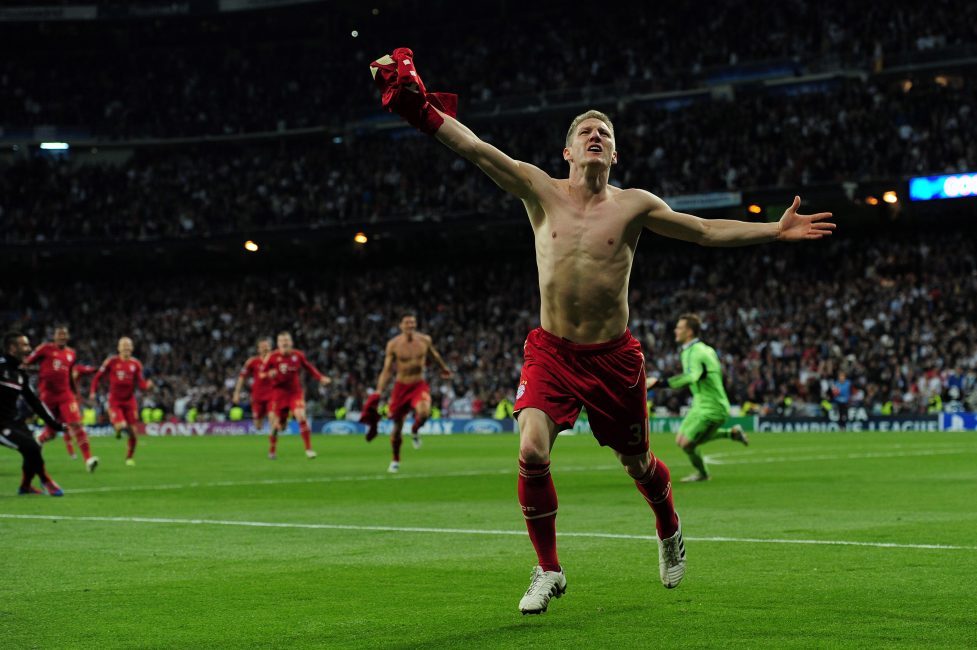
(Image: Shaun Botterill/Getty Images)
This moment will be indelibly etched in my mind. This moment when Schweinsteiger took responsibility as if he did not have a care in the world – for his team and the dream of an entire city. A responsibility that he should choose to shoulder again just a month later – but a certain Czech keeper and a goal post had other ideas.
But it is exactly this sequence of failing, getting back up, dusting yourself off and trying once again that is so representative of Schweinsteiger’s career and makes him so humanly relatable. His emotions on the pitch were the same as my emotions in front of the TV. Raw and genuine.
“Can a single moment last for a whole World Cup?”
Lukas writes for Football Arguments about football history.
I admit that for me too the bloody scratch underneath the eye he suffered during the 2014 World Cup final first comes to mind when I think of Bastian Schweinsteiger. But on reflection, there is another Schweinsteiger moment that means a little more to me yet.
Although…can a moment last for an entire World Cup tournament? Because for me, Schweinsteiger did not reach his peek at those moments of his greatest triumphs, but during the 2010 World Cup.
In the context of contemporary football history, the year 2010 lies squarely in the middle of the Spanish-Catalan reign. „Tiki-taka was king“ and the best midfielders of our time all played for FC Barcelona. They shaped an era in football history and they have to be considered as sitting above Schweinsteiger in the pantheon of world football.
BUT – and this is no small “but” – at the 2010 World Cup, the tournament that the magicians of passing from Spain should eventually go on to win, they were not the best players in my view. The best player was Bastian Schweinsteiger.
“Go out and show to the world that you are a better player than Messi!”, Löw said on the late evening of July 13, 2014 to Mario Götze – and for one moment at least he really was better than the global high water mark in his position. Schweinsteiger, however, achieved something at the 2010 World Cup that I rate far higher: he surpassed the governors in his position not just for one moment, but for an entire tournament. And during his solo run against Argentina, he really was “better than Messi”!
Of course, this solo run is the most memorable scene of Schweinsteiger’s exploits at the 2010 World Cup. But in all its skillfull glory, it was also the exception rather than the norm for his playing style. This is why I have chosen a much less spectacular scene. It is from the same game and shows Messi during his most dangerous attack on the German goal. The Argentine receives the ball a few meters outside the German penalty area, initiates a short dribble and… drives the ball uncharacteristically harmless straight at Neuer. Only the replay reveals that Schweinsteiger managed to give the ball the slightest of deflections at the last minute. Better than Messi – already in 2010! This was typical of Schweinsteiger’s tournament. He demonstrated to all the world that for one summer, he could let it roll with the big guns.
“Dribbling South American South Bavarian style”
Dennis pulls the strings in the engine room of Miasanrot.
July 3, 2010. A sunny Sunday. Argentina against Germany in the World Cup quarter-finals. It had to be Argentina, of course. It was hardly six weeks before that Diego Milito and Inter Milan had consigned Bayern to the role of spectators as they received the big-eared Champions League Cup. And did they not also still have a score to settle from the 2006 World Cup quarter-finals? All the battles of Schweinsteiger against Higuain’s Real, Messi’s Barca, Simone’s Atletico and the legendary 2014 World Cup final are yet a distant future at this point.
I watch the game on a medium sized TV set that has been brought outside for common viewing. The sun shines from behind and the Germans wear their black shirts. So the only way I can tell that Germany is in possession is when the ball flashes wildly across the screen from left to right as if in a pinball machine, confining the Argentinians to the role of helpless spectators. So too in the 74th minute. The ball is on the left-hand side with two Argentinians immediately in front of it. Two passes are played and now the ball is even further outside and even further back. But then someone seems to have pulled back the pinball plunger and all of a sudden everything is happening at once. Within seconds, the ball flashes from the edge of the penalty area to the goal line close to the six yard box, zigzagging past Di Maria, Pastore, and Higuain. Then it bounces back inside past Abbondanzieri and Heintze before it rolls into the goal. 3-0 Germany. Incredible.
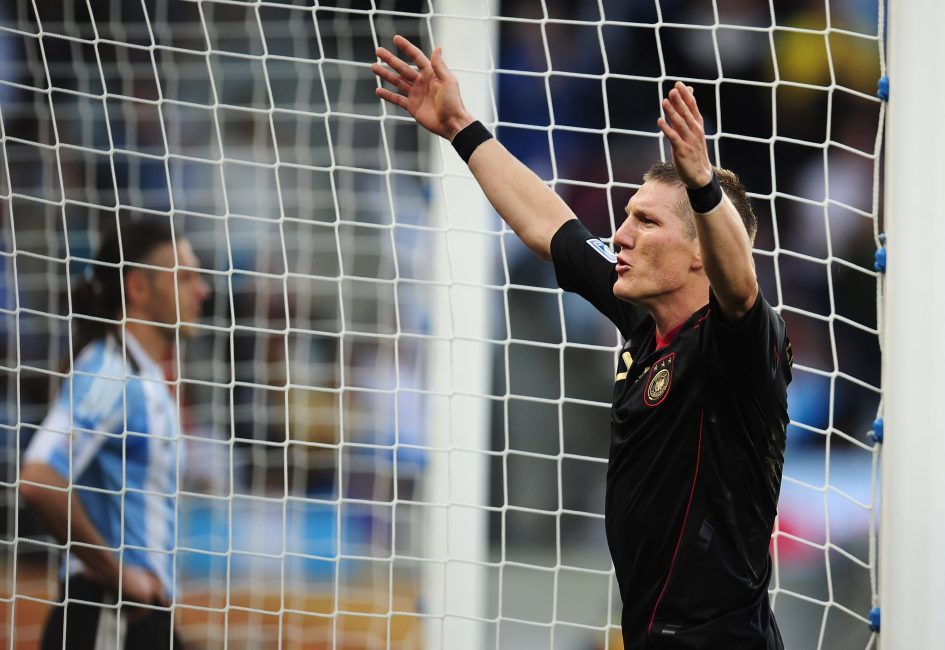
(Image: Clive Mason/Getty Images)
Angela Merkel celebrates in the stands. Diego Maradona casts a puzzled look on the two German protagonists of the scene. One is Bastian Schweinsteiger, who has just dribbled almost casually through Argentina’s penalty area in best South American fashion. With every replay, the scene becomes more outrageous. Unbelievable. And the other one is Arne Friedrich, the scorer of the third goal for Germany and his first in the national team. In the 77th minute. Even the “Fußballgott” cannot suppress a smile.
“The fiercely determined Schweinsteiger has touched something within me”
Christoph calls the Bundesliga for Amazon and is the host of the Forecheck podcast.
Being a sports journalist and a fan at the same time, well, that is a complicated thing. Back at the 2002 World Cup final, I was still a fan through and through. Germany against Brazil. I attended a Public Viewing with my mohican haircut (I had lost a bet, do not ask, there was alcohol involved). I was still a fan at the 2006 World Cup. I remember how I embraced a total stranger after the penalty shootout against Argentina. Same thing 2010. Argentina again. Me cheering and jeering at a bachelor party.
But 2014? I had become a sports journalist in the meantime, this was my job now. I had developed quite a bit of professional detachment. I had never really consciously witnessed a German World Cup triumph before, but whether Germany or Argentina would win the title, I did not really care. I watched the game quite relaxed on my couch.
But then I got sucked in again, I could not help it. Bastian Schweinsteiger is to blame. How he played, fought, led – phenomenal. I am positive that every successful team needs a leader who is a motivator and an inspiration for his teammates and can carry a whole match on his shoulders. At the Maracanã, this was Bastian Schweinsteiger, the captain without a captain’s armband. I did not think that this was possible, but the bleeding, fiercely determined Schweinsteiger touched something inside me. And even though I did not celebrate when the game was over but only smiled a little: Bastian Schweinsteiger had managed to stir up the old football fan in me one more time. Heart rather than mind. It was a good feeling.



